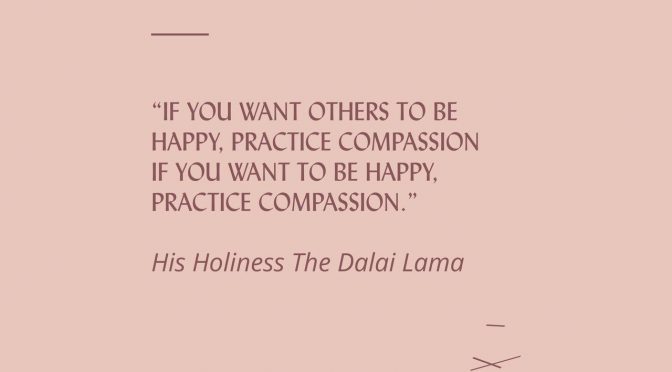As I referenced the Dalai Lama yesterday, I thought it might be nice to kick off today’s letter with a quote from him and also study one of his key teachings, compassion. I think we are all at times confused about the essence of compassion. These are ideas, and I encourage you to form your own theories around them, through pushing the limits of your understanding. We can’t keep intellectual ideas on a page, we have to take them for a drive, see how they feel for us and find our truth within them. There is no ‘perfect right answer’ as there is no ‘wrong answer’. Don’t take anything anyone says as gospel without trying it out for yourself.
So, on to compassion! I’m confident we would all like it applied to us, and I hope we are all dedicated to being compassionate to others, but honestly, how do we go about it in today’s modern over-hyped world? Compassion is far more than a hashtag and some ancient concept that we apply 1% of our time to. Can we even be compassionate f we don’t understand the true essence of it? The Dalai Lama says that compassion is one of the key sources of happiness and that the more compassionate our mind is, the better our brain functions. He also speaks of compassion giving us an inner strength, self-confidence and a reduction in fear. These then, increase our happiness. Sounds good yes?
Something that frequently comes up with compassion though is that it’s all about being a nice person. Sure, that’s part of it, however, most Buddhist teachers say practising compassion and being a nice person are in fact two different things. Let’s take into account the advice of Chogyam Trunpa, a great Tibetan Rinpoche, who frequently highlighted we shouldn’t have ‘idiot compassion’. Which he describes as having the right intention, with the concept of ‘being good’ or ‘being nice’ becoming a road to pain through not having any boundaries, avoiding conflict and letting people walk all over us. He speaks of ‘idiot compassion’ as lacking in courage and intelligence. True compassion as he describes it, is not shying away from discomfort or pain, but working with it. One of Chogyam Tungpa’s more well-known students, Pema Chodron says of idiot compassion, “It refers to something we all do a lot of and call it compassion. In some ways, it’s whats called enabling. It’s the general tendency to give people what they want because you can’t bear to see them suffering. Basically, you’re not giving them what they need. You’re trying to get away from your feeling of I can’t bear to see them suffering.
In other words, you’re doing it for yourself. You’re not really doing it for them.” Clearly, we can see this is not true compassion, but a trap we all fall easily into, especially when telling ourselves we’re just trying to be compassionate!
Compassion isn’t trying to promote or defend ourselves, which is the opposite of compassion, but is actually tapping into our basic goodness, AND additionally having boundaries. As Brene Brown explains, “The most compassionate people that I’ve ever interviewed…happened to be the most boundaries. They happened to be the people who had very, very clear boundaries about what they were willing to do, what they were not willing to do, what they were willing to take on, and what they were not willing to take on..”
Brene also describes which I like immensely, “I have a little boundary mantra now that’s…choose discomfort over resentment. In those moments that sometimes it’s uncomfortable to say “No, I can’t,” or “I’m sorry, I’m not available,” and it feels uncomfortable. But it’s so much better for me to choose to be uncomfortable in a moment, than feeling complete resentment and judgment forever.” This I think is a wonderful practice for compassion. Turning up half-heartedly, with a tinge of resentment and a story that ‘we are such a generous person’ is actually nonsense. But if you’re a recovering people pleaser like me, you’ll be very used to dealing with this situation and I hope motivated to get out of it as a habit!
I also like holding what I call ‘optimal humanity’ in mind. Sure, not everyone is going to be operating on the same wavelength as us, but assuming everyone is also out to get us, really strips us of our ability to be compassionate. Brene Brown explains, “What I’ve learned for me, around boundaries and compassion, is that I don’t know whether people are doing the best they can or not, but my life is better when I work from the assumption that they are. …But at the same time, that means that I need to have really clear boundaries.So instead of judging you, and feeling resentful, and feeling like you’re sucking me dry, or you’re taking advantage of me, I need to assume that you’re doing the best you can. And I need to set my boundaries, and not get involved to the degree where I lose control over how I feel about myself and what’s going on in that relationship.”
So compassion is an action, involving very deeply personal responsibility. It’s so much deeper than ‘oh I really feel for that person’, as we can start to see. It’s about knowing ourselves as humans deeply, so we can understand others better. Pema also says, “The only reason we don’t open our hearts and minds to other people is that they trigger confusion in us that we don’t feel brave enough or sane enough to deal with. To the degree that we look clearly and compassionately at ourselves, we feel confident and fearless about looking into someone else’s eyes.
I hope this brings compassion into a new light for you and gives you some things to play with.
Sent with love,
Jac x

